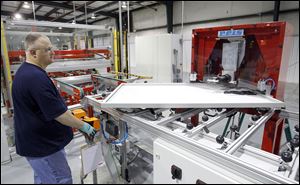
Napoleon solar plant Isofoton to adjust if major client loses funding
1/11/2013
Kevin Morris uses a machine to crimp the corners of a 250-watt solar panel frame at Isofoton in Napoleon. Job creation could halt there if it does not get orders from a proposed solar panel farm.
NAPOLEON — Isofoton North America is ready to adjust its business plan if its biggest client — the largest proposed solar-panel farm this side of the Mississippi — drastically reduces its operation or folds.
Isofoton executives were counting on the $180 million Turning Point Solar Project to jump-start their Napoleon solar-panel plant, which became operational in December.
However, a decision handed down by the Public Utilities Commission of Ohio on Wednesday crippled Turning Point’s financing.
“My first obligation is to the people that already have jobs,” Michael Peck, chairman of Isofoton North America, said of the 33 workers at the Napoleon facility.
Isofoton’s $31 million plant was supposed to have more than 100 employees by the end of last month, but those plans didn’t come to fruition because of complications with Turning Point, Mr. Peck said.
The company planned to eventually hire 330 people at its facility, which is 40 miles southwest of Toledo.
That job-creation goal is up in the air as the future of Turning Point is hashed out, Mr. Peck said.
“Turning Point represents that kind of critical mass purchase order that you need to get a factory up and running,” he said. The Turning Point project is located near Zanesville, about 60 miles east of Columbus.
Isofoton was funded with a $5 million loan from the Ohio Air Quality Development Authority and a $3 million loan from the Ohio Development Services Agency.
The company is in good standing with its state-funded financing, officials at both agencies said Thursday. Mr. Peck said he intends to repay the state, and the government-funded loans he received are on his mind every day.
American Electric Power, a key player in the Turning Point project, asked the state to bill customers for the cost of power sourced from the project.
The Public Utilities Commission rejected that notion in a 3-1 vote, stating: “The commission ... finds that the signatory parties have not demonstrated that the Turning Point provision of the stipulation benefits ratepayers and the public interest.”
AEP, which initially committed $20 million in funding to Turning Point, does not know how it will proceed or if it will continue with its stake in the solar development, said Terri Flora, an AEP spokesman.
Turning Point spokesman Dave Celona said he hopes the project still can come together. It would create almost 300 construction jobs and pump at least $150 million into the facility’s construction.
How financing is arranged is still being worked out, he said.